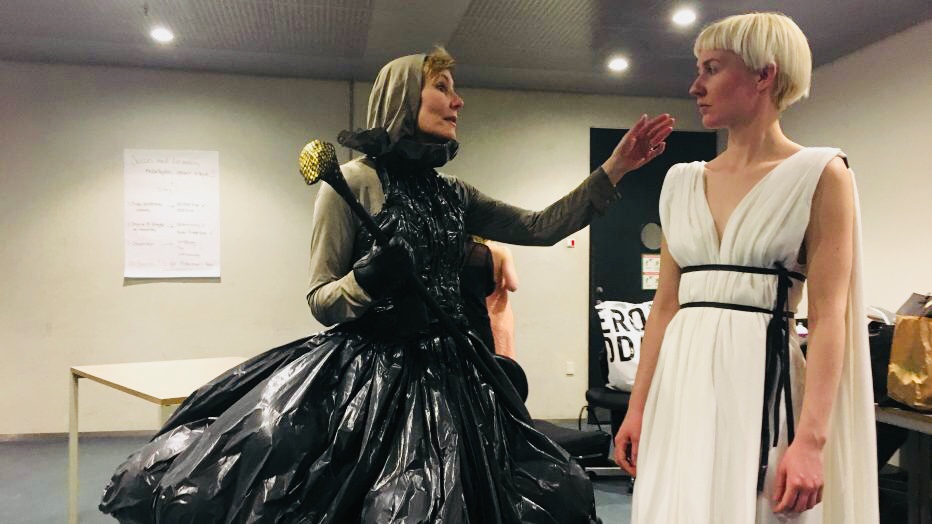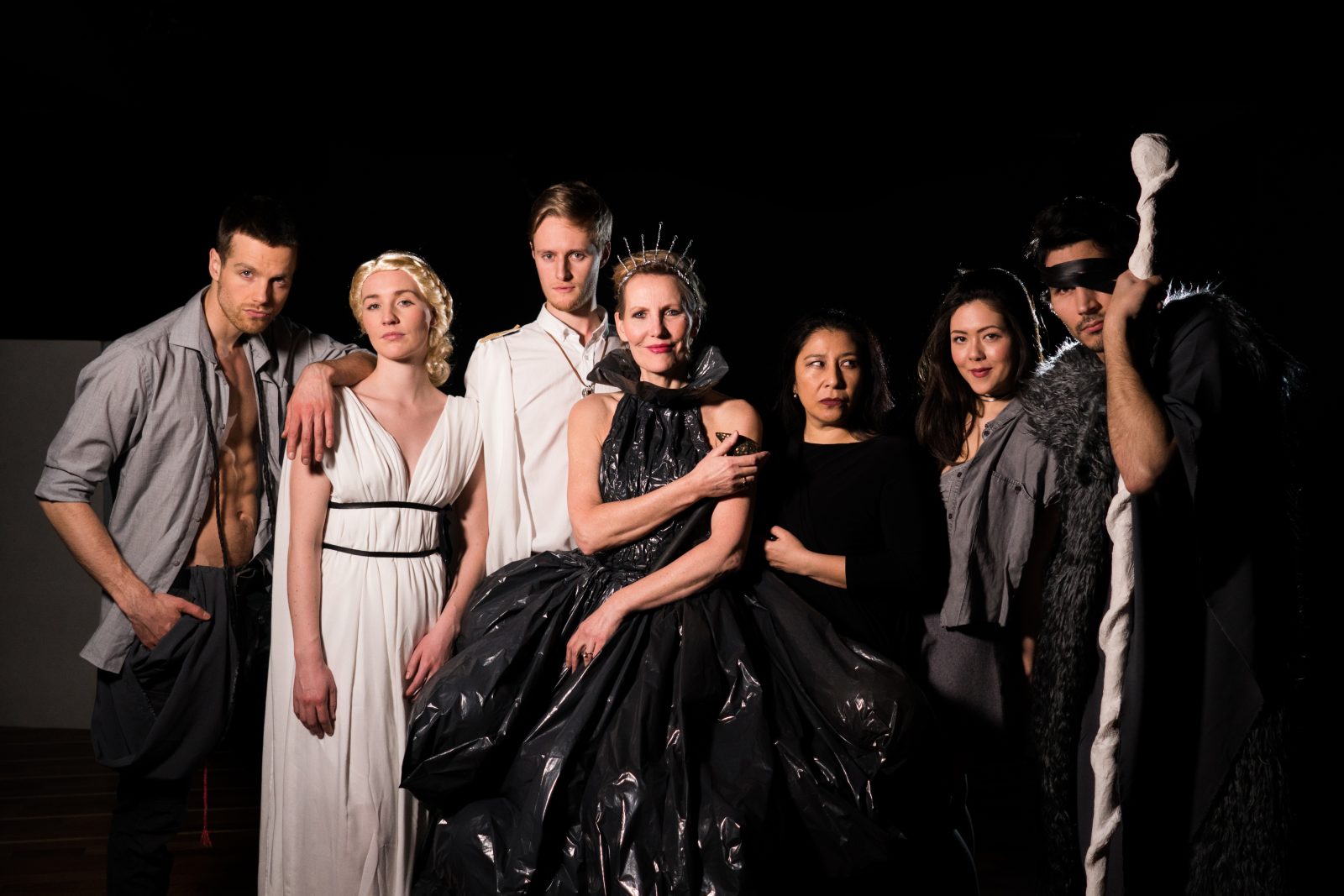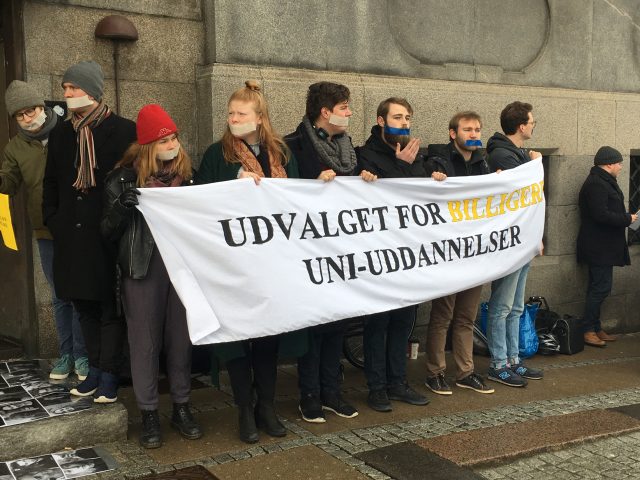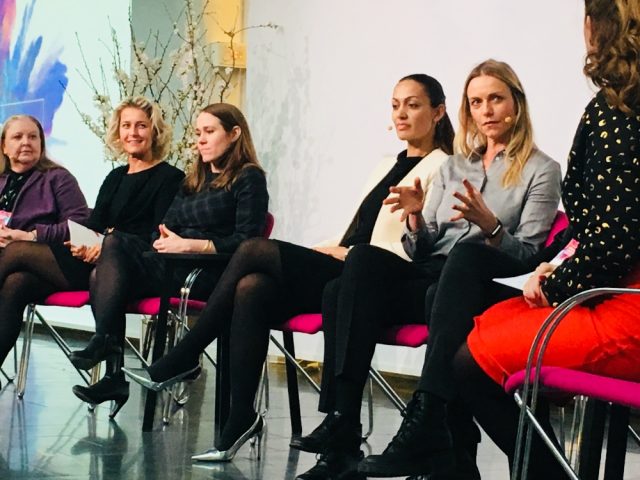What does Theatre have to do with CBS? Everything!

Annethia Lilballe as Klytemnestra and Kristine Helms as Elektra rehearsing at Solbjerg Plads building in room 208 (Photo: David Fulop)
It is Saturday and a handful of CBS students and several professional actors are meeting at CBS. Not for reading, studying, or networking. Instead, they are going to shout, cry, wrap ribbons around themselves and be covered in black plastic bags. They are part of CBS Theatre and are getting together to perform a modern adaptation of the Greek Tragedy, Elektra. But why on earth would CBS students do this?
What does CBS, Theatre, and Elektra have in common? If you agree with the people involved with the project, then the answer is… Everything!
Marley Hasselbach, a recent graduate from CBS and the directing founder of CBS Theatre, believes that acting and producing Theatre can help with the professional and academic development of the students involved.
“People feel that CBS is only for people who are studying to be management consultants. But there are so many ways in which you can use knowledge about running an effective organization. This is really what’s at the heart of CBS,” he says and continues:
“Sometimes you get a production that might be really good. It’s well rehearsed, has good actors, and there’s chemistry between the cast. But if there’s no audience then it hasn’t really succeeded. You need both, you need that organization. That’s exactly what CBS Theatre is about.”
CBS students that joined the Theatre troupe generally have two roles, either they join the production crew or become actors in the play. In the end, each student gets something completely different out of the process.
Kristine Helms, an aspiring actress, performs a moving sketch from her role as Elektra in CBS Theatre's modern adaptation of the Greek tragedy, Elektra.
No longer afraid to embarrass myself
Julia Mangan, a MSc Business, Language, and Culture student and an actress playing one of the Chorus roles, used to dread doing oral exams and presentations when she first started at CBS. But performing has helped her gain the confidence that she needed in order to become a natural at presentations, oral exams, and networking.
“It’s all about connecting with the audience. My experience with acting has definitely made me more aware of the audience, it’s incredibly important to capture the other person’s attention, and that’s something you work with in Theatre because you are so exposed. Doing things that are naturally uncomfortable for people to do, such as acting in front of an audience, has helped me put things in perspective and feel more comfortable when I’m off stage,” she says.
Julia Mangan, a BSc Business, Language, and Culture student from CBS, performs a thought-provoking sketch from her role as one among the Chorus women in CBS Theatre's modern adaptation of the Greek tragedy, Elektra.
But according to her, this transformation took a lot of hard work. Memorizing lines, getting the choreography right, and rehearsing scenes spanned for several months in time.
“It wasn’t just, ‘let’s quickly organize a skit that we’ll show in front of the rest of the students.’ It was a six to seven-month-long process, which we rehearsed at least once a week for that entire amount of time, then a whole week of performing in front of a sold-out audience every night,” she says and continues:
“That really helped everything to stick and program itself into my brain and my body. Now, I’m more confident in myself and I’m not afraid to make mistakes. You shouldn’t feel afraid of embarrassing yourself. Because in the end, no one cares besides you. My experience with Being Boeing really taught me that.”
I got a sense of what it’s like to work in Theatre
Gabriel Elung, a BSc in Business Administration and Organisational Communication student and the production coordinator at CBS Theatre, joined the troupe for different reasons. Even before he started studying at CBS, he knew that he wanted to work with Theatre. Now he aspires to start a production company that focuses on Theatre.
“I don’t know how it’s going to look like yet. That’s why I’m here. To learn about business and surround myself with people who know a lot more about theatre than I do. It really puts my studies into context. When I graduate, I’ll know a little bit about business, and by working with Theatre, I’ll be able to start a production company and ultimately help other Theatre groups get funding,” he says.
Gabriel Elung, a student from CBS and the production coordinator for CBS Theatre, and Becky Waterton, project manager at CBS PRME and stage manager for CBS Theatre, are crafting a map for the set of the Greek Tragedy, Elektra.
Gabriel Elung has volunteered in Theatre projects before, but this is the first time that he has taken on a considerable amount of responsibility as a producer.
“I feel a lot closer to the project. Even though it’s a university Theatre, I got a sense of what it’s like to work for real. It feels like a regular Theatre because we’re playing it at a scene and we’re selling tickets. I’ve learned a great deal about producing, the grinding, the actual work involved,” he says.
Ida Marie-Højris, costume designer and fashion designer from KADK adding the finishing touches to Belen's (played by Robin Schmidt) costume during a rehearsal at CBS.
After joining CBS Theatre, Gabriel Elung was immediately thrown into the deep end of the pool. All of a sudden, he had to juggle between his studies, work, and the production. Not to mention that he had to contact influential people to ensure that the production can continue.
“It was the first time that I had to work with outreach. Applying for funds, contacting papers and reviewers, and so on. That was one of the more difficult things I had to do because it really puts you on the spot. Having to contact people who are professional and asking them to come see the show and give us some money so that we can actually do it,” he says.
People making themselves vulnerable
Marley Hasselbach wants all of his plays to be of the highest caliber. According to him, this can be challenging at times, but the results show for themselves in the end.
“You spend so much time on it. Rehearsing six hours at a time, and then there’re the producers running around all day. The vision for me is that it can only be that much work if it ends up really good. And I, as the director, see that as my role. To maintain that level,” he says and continues:
“There are people on this show who have never done a full production before. They’ve grown so much since the start. Theatre is best when people make themselves vulnerable, and that’s why you get a lot of intense emotional interactions. You work together in a way that you normally never would.”
The actors from CBS Theatre's Elektra are rehearsing at CBS' Solbjerg Plads building room 208.
Julia Mangan and Marley Hasselbach both agree that preparing for this year’s performance of Elektra was very different when compared to last years Boeing Boeing, and it had its own set of challenges.
“Elektra challenges the actors in a very different way. It’s less about timing, movement, and comedy, and much more about digging deep into yourself and the character that you’re playing. You have to give people that space to make themselves vulnerable. We’re transitioning from the moment where the actors were just telling the story to a point where they are acting out these characters who are far from them, characters from ancient Greece,” says Marley Hasselbach.
Julia Mangan experienced the harshness of digging deep not only on her own skin but also on the team of actors involved.
“For me, the most difficult part of this performance was establishing the team spirit. Making sure that communication is done right. Everyone has different ways of communicating, especially in a setting like this. It’s stressful, you’re under pressure, it’s hectic, it’s intense. We’re all different kinds of people, and we only have a certain amount of time to do all these things. Feelings get trapped, or not explained well enough, but that’s very common for any team or group setting, that’s always going to be an issue and it is very important to take that seriously and constantly work on it,” she says.
Entering the realm of darkness
There is a stark contrast between last year’s show, Boeing Boeing, and Elektra. One being a comical farce inciting laughter, while the other dragging the audience towards deeper, meaningful introspection. The reason it can do this is because of the timelessness of it.
“What I find the most interesting about Greek tragedies is that they are timeless. It’s like Game of Thrones, it’s not about the historical aspect, it’s really about human beings. Greek Tragedies always take place in a single stretch of time, there’s always this moment of downfall, the characters are noble, they’re inherently good, but because of a single flaw in their character, often pride, they meet their downfall,” says Marley Hasselbach.
Pejman Khorsand-Jamal, performs a powerful sketch from his role as the ward in CBS Theatre's modern adaptation of the Greek tragedy, Elektra.
Greek tragedies are known for their deep and meaningful plot lines, which are interlaced with philosophical messages that are somewhat open to interpretation. For Julia Mangan, it is a play about finding the right path towards justice.
“It’s about Elektra and all the choices that she has to face, the tragedies of her time. It’s a lot about justice and doing what’s right. And doing what’s right isn’t always the easiest. It’s about making hard decisions and sticking to them. There’s a lot to be learned from this play,” she says.
Annethia Lilballe performs a bone-shivering sketch from her role as Klytemnestra in CBS Theatre's modern adaptation of the Greek tragedy, Elektra.
Marley Hasselbach also believes that there is a lot to be learned from this play and notes that the timeless characteristic of the story makes for a great modern-day lesson to all the viewers.
“The message in Elektra is that you have to take a stand, to fight for peace. You can’t just look away when you’re confronted with violence Everyone collectively struggles with fighting against this violent wave. It’s really about how brave it is to make peace, to forgive people because that’s the whole thing about revenge, it’s a chain and it just goes on and on,” he says and continues:
“We live in a very violent world. We see everything and we know about everything. But we don’t really process anything, we don’t take a stand about anything. I want people to feel more uncomfortable about the fact that if you just passively watch things then you’re not good, you’re just neutral. To make them feel more aware of the darkness in our hearts. This feeling of discomfort can encourage self-reflection, which is ultimately the aim of all Theatre.”




































































































































Comments